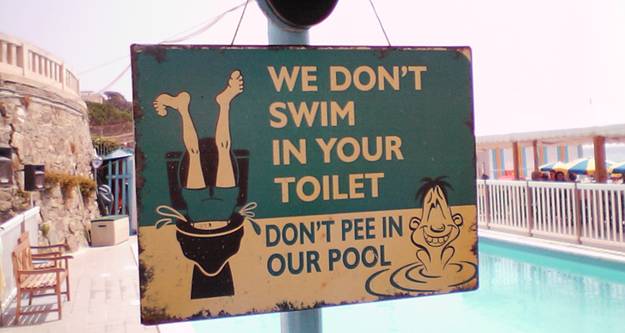Pee in Pools is It Safe?
Home -> Help -> Guides -> Don't Pee in Our Pools
Peeing in Pools
Your Swimming Pool Is Not a Big Blue Toilet

No one likes to mention it, but so many people do it. It’s the ‘ick’ factor that everyone who swims in a pool faces ? people who pee in the pool.?
One of the biggest unwritten commandments of the summer: Thou Shalt Not Pee in the Pool ? is very often ignored by people who believe it doesn’t make a difference. Admit it -- you’ve done it too, haven’t you?? As many as a fifth of all American swimmers have admitted to using the pool as a bathroom, and competitive swimmers also have admitted to doing it all the time.?
There is a misconception that there’s no harm in urinating in the pool because of the chemicals already in the pool for cleaning it, and many people are unaware of the diseases that can be found in a contaminated pool.? There is already loads of “icky” stuff in most pools ? insects and plant material, dead skin cells, sweat and fecal coliform bacteria (from kids wearing diapers in the pool). ??The American Chemical Society’s journal, Environmental Science & Technology, recently published a new study that looked at the chemistry of what happens when urine meets chlorine, and the findings would make you think twice about using the pool as a potty.
The chlorine that is used to clean and sanitize your swimming pool is very good at killing dangerous bacteria like E. coli, but it can form harmful irritants when combined with uric acid.?? Uric acid, a chemical in both urine and sweat, reacts with chlorine in the swimming pool to create chemical byproducts such as trichloramine and cyanogen chloride, which are potentially dangerous compounds.? The amount of sweat generated by vigorous swimming is negligible but, on an average, each person that urinates in the pool leaves about 30 to 80 milliliters of urine in the pool.? When there are a lot of people doing this, it becomes a big concern because these harmful compounds form quickly and deplete the chlorine in the pool, allowing the compounds to be present in the pool for longer than normal and potentially to cause more harm.
Cyanogen chloride has adverse effects on the lungs, cardiovascular system and central nervous system, and has been used (in much larger doses) in chemical warfare.? Exposure to trichloramine has been linked to childhood asthma and it can irritate lungs and cause skin irritations.
According to The Association of Pool and Spa Professionals, in 2013 there were more than 8.5 million private pools in the U.S., and another 309,000 commercial ones.? That’s a lot of opportunity for mishap.?
Of course, one could argue that the other disinfection by-products in pool water are equally worrisome, since some are known mutagens (i.e., they cause mutations), which could lead to cancer.? The same could be said about the drinking water in many areas.? The important thing to remember is that the pool was made for swimming and having fun.? Don’t pee in it, and don’t drink the water.
Those warning signs advising that you shouldn’t pee in the pool are not a joke ? you should take them seriously.? The next time you’re in a crowded pool, if the water makes your skin itchy or irritates your eyes. . . it might be because your fellow swimmers chose to ignore the warnings.? Oh, you may also want to avoid the kiddie pool.

